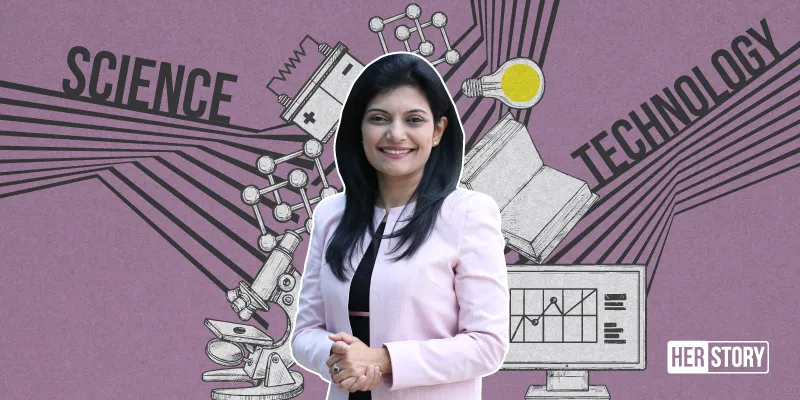[Women in Tech] 22 years at SAP Labs and counting, Sindhu Gangadharan on facing the pandemic, challenges, and inclusivity
Sindhu Gangadharan, SVP – SAP User Enablement & MD at SAP Labs India, traces her 22-year journey at the company and explains how the last year has been a learning phase.
Growing up in Bengaluru in the 80s, Sindhu Gangadharan was fascinated by the incredible possibilities of technology. A love for Mathematics coupled with the fact that her home city was slowly transforming into the Silicon Valley of India led her to pursue an undergraduate degree in Computer Science from Bangalore University, with a determination to enter the IT sector.

The Senior Vice President – SAP User Enablement & MD at SAP Labs India, says while a career in technology was a natural choice, her parents wanted her to take up medicine, “as most Indian parents expect one of their offspring to do”.
“But at the time, I found technology really cool and chose tech over medicine as it gave me an opportunity to help the world run better with technology and secondly, I became a part of this glorious organisation, SAP,” she recalls.
After her graduation, Sindhu joined SAP Labs India as a software developer for its CRM Middleware. This was in the late 90s when SAP had just set up its operations in India.
Cashing in on the IT boom
“A couple of years into my journey at SAP Labs India, I moved to the headquarters in Walldorf, Germany, where I held several strategic and leadership positions and played a pivotal role in shaping SAP’s Integration Strategy by growing SAP’s Integration product portfolio as Head of Product Management for SAP Cloud Platform Integration, IoT, and SAP Process Orchestration,” she says.
Sindhu recalls the exhilarating moment when she was tasked to head SAP’s strategic and global Intelligent Enterprise Program, reporting to SAP’s Executive Board.
“This role put me in the lead position to bring to life SAP’s vision and strategy of the Intelligent Enterprise by orchestrating the end-to-end process delivery roadmaps to rapidly transform data into valuable insights for customers,” she adds.
In late 2019, just months before COVID-19 hit India, and after spending 19 years in Waldorf, Germany, Sindhu moved back to Bengaluru to lead Labs India unit as its Managing Director.
She is now responsible for product development and innovation at SAP's Research and Development facilities in Bengaluru, Pune, Mumbai, Hyderabad, and Gurugram. In parallel, she also leads SAP User Enablement as Senior Vice President with much of her team based out of Waldorf.
Facing the pandemic
Personally, Sindhu believes the past year has been one of her biggest learning phases – reacting and adapting immediately while trying to continue normalcy.
“When the pandemic hit, our primary focus was our employee safety, while making sure business continuity was not impacted in any way. About 77 percent of the world's transactions touch SAP system, which means the business continuity aspect is something important, and therefore we are completely committed to making sure that the business systems of our customers are always operational,” she says.
When the situation mandated the whole firm to work from home, Sindhu says it was not new to the team.
“The majority of our colleagues have been advised to work from home and have been equipped with all necessary infrastructures. We are constantly communicating with our colleagues via e-mails, video calls, conducting virtual entertainment programs and group sessions to keep their mood positive. We understand it’s difficult to keep everyone’s spirits high and feel unity when people are working remotely. Hence, we introduced the SAP Come Alive initiative, which offers online fun, wellness, and motivational programs - ranging from Zumba, Yoga to virtual music contests,” she says.
The second wave of COVID-19 has seen the Crisis Management Team (CMT) working 24x7 to offer emergency services and arrange essential supplies including medical oxygen, ventilators, ICU beds, etc, for employees and their families, irrespective of their locations.
“Our SAP Labs India colleagues are volunteering for the Karnataka State Government’s COVID War Room while also contributing to create applications to help run the war rooms better. Our teams are also supporting Indo German Chamber of Commerce (IGCC) and its 4,500 members by leveraging SAP Jam to build a marketplace for the exchange of COVID resources among member companies. SAP is augmenting the health care system by supporting the construction of make-shift hospitals and by creating additional bed capacity at existing hospitals across locations,” she adds.
To keep learning and development initiatives ongoing, SAP also announced a new digital learning program offering innovative and interactive educational content to support students, professionals, and anyone wishing to continue to learn. The award-winning open SAP platform provides massive open online courses (MOOCs) to anyone interested in learning about leading technologies, the latest innovations, and the digital economy.

Challenges make work-life more enjoyable
As the MD of SAP Labs India, Sindhu oversees the functioning of over 10,000 SAPians spread across Bengaluru, Mumbai, Delhi, Pune, and Hyderabad - Labs India being SAP’s second-largest labs outside Germany.
Challenges, she says, are inevitable, and make work-life more enjoyable.
“When I got the opportunity to lead SAP Labs in India, I was prepared for a significant learning curve ahead of me as I was returning to Bengaluru after almost two decades. I was more German in my outlook and professional life. My family and I consisting of my husband and two school-going girls, were deeply embedded in Germany's social fabric,” she says.
However, she believes it is very important to be flexible and to step out of one’s comfort zone every once in a while. “I was very fortunate that my husband and daughters supported my decision to relocate to India. It's now close to two years since we moved back here, and I am glad that I accepted this role, as it has given me significant learning opportunities,” she adds.
Also, as a leader bringing together 14,000 members of SAP in India family during a crisis and navigating them through the unprecedented events of a pandemic and supporting them and their families round-the-clock has given her an immense sense of gratification.
Battling biases and stereotypes
According to Sindhu, gender imbalance is primarily due to the misconception that women professionals are weak and will not sustain the rigorous work that leadership demands.
She explains: “The way I see it, I think male leadership traditionally means being more decisive and aggressive, whereas women leaders are more empathetic, have more patience and emotional intelligence. This makes people believe that we aren't capable of making hard decisions. We have numerous examples to prove that. For instance, for the first time in the history of NASSCOM, we have two women tech leaders holding the offices of President and Chairperson.”
Given the skewed gender ratio in tech, Sindhu emphasises that networking becomes even more important for women in technology to stay connected with each other, share industry updates, find mentors, or even develop long-lasting professional and personal relationships.
“I feel women, who are fortunate to be in a position of power and influence should go the extra mile to help and encourage others who look up to them and seek their support. I think it is our collective responsibility to always stand up for one another and be each other’s support systems,” she says.
Sindhu is also an Executive Council member of NASSCOM and helps drive India’s IT growth trajectory. In January 2021, she was appointed to the Board of Directors at Utah-based Qualtrics International Inc, the global pioneer of the Experience Management software category. She also serves on the Board of Titan Company Ltd as an Independent Director with a focus on technology. In March 2021, she was appointed to the Advisory Board of ReLoop by SAP.
Creating the right environment
In this regard, Sindhu elaborates on the role of organisations to be both responsible and inclusive.
“We should take responsibility to create that right environment for them where they feel encouraged and motivated every day at work and receive the necessary guidance to deliver their best. Now, when we talk about creating the right environment, it consists of certain aspects, including pay equity, flexible work options, equal opportunity, leadership development, mentoring, etc.,” she adds.
At SAP, she says, the Equal Pay for Equal Work Policy promotes pay transparency - which further strengthens the trust between our female colleagues and the organisation, driving them to give their best.
Besides a few technology leaders at SAP, Sindhu counts tech visionary like Steve Jobs as her role model. In her spare time, she loves to indulge in a good workout, whenever possible.
“With remote working and lockdowns, I try and reserve some time on weekends for home workouts and yoga. Fitness is no longer a luxury, it’s an absolute necessity for each one of us. On other occasions, I try and make it a point to read a book before I go to sleep,” Sindhu says.
Edited by Megha Reddy


![[Women in Tech] 22 years at SAP Labs and counting, Sindhu Gangadharan on facing the pandemic, challenges, and inclusivity](https://images.yourstory.com/cs/4/8e7cc4102d6c11e9aa979329348d4c3e/Women-in-Science-and-Tech2-1621143296856.png?mode=crop&crop=faces&ar=2%3A1&format=auto&w=1920&q=75)
![[Women in Tech] Building an inclusive and adaptive workplace is critical to attract and retain women in tech roles, says Ushasri Tirumala of Manhattan Associates](https://images.yourstory.com/cs/4/8e7cc4102d6c11e9aa979329348d4c3e/Women-in-Science-and-Tech1-1619937852589.png?fm=png&auto=format&h=100&w=100&crop=entropy&fit=crop)
![[Women in Tech] Grit, passion, and making the right decisions can help you achieve anything, says Gagan Sodhi Menon of Teleperformance India](https://images.yourstory.com/cs/4/8e7cc4102d6c11e9aa979329348d4c3e/Women-in-Science-and-Tech2-1618065371619.png?fm=png&auto=format&h=100&w=100&crop=entropy&fit=crop)
![[Women in Tech] Opportunities come to those who ask for them, says Katya Ivanova of Acronis](https://images.yourstory.com/cs/4/8e7cc4102d6c11e9aa979329348d4c3e/Women-in-Science-and-Tech-1619336336991.png?fm=png&auto=format&h=100&w=100&crop=entropy&fit=crop)




